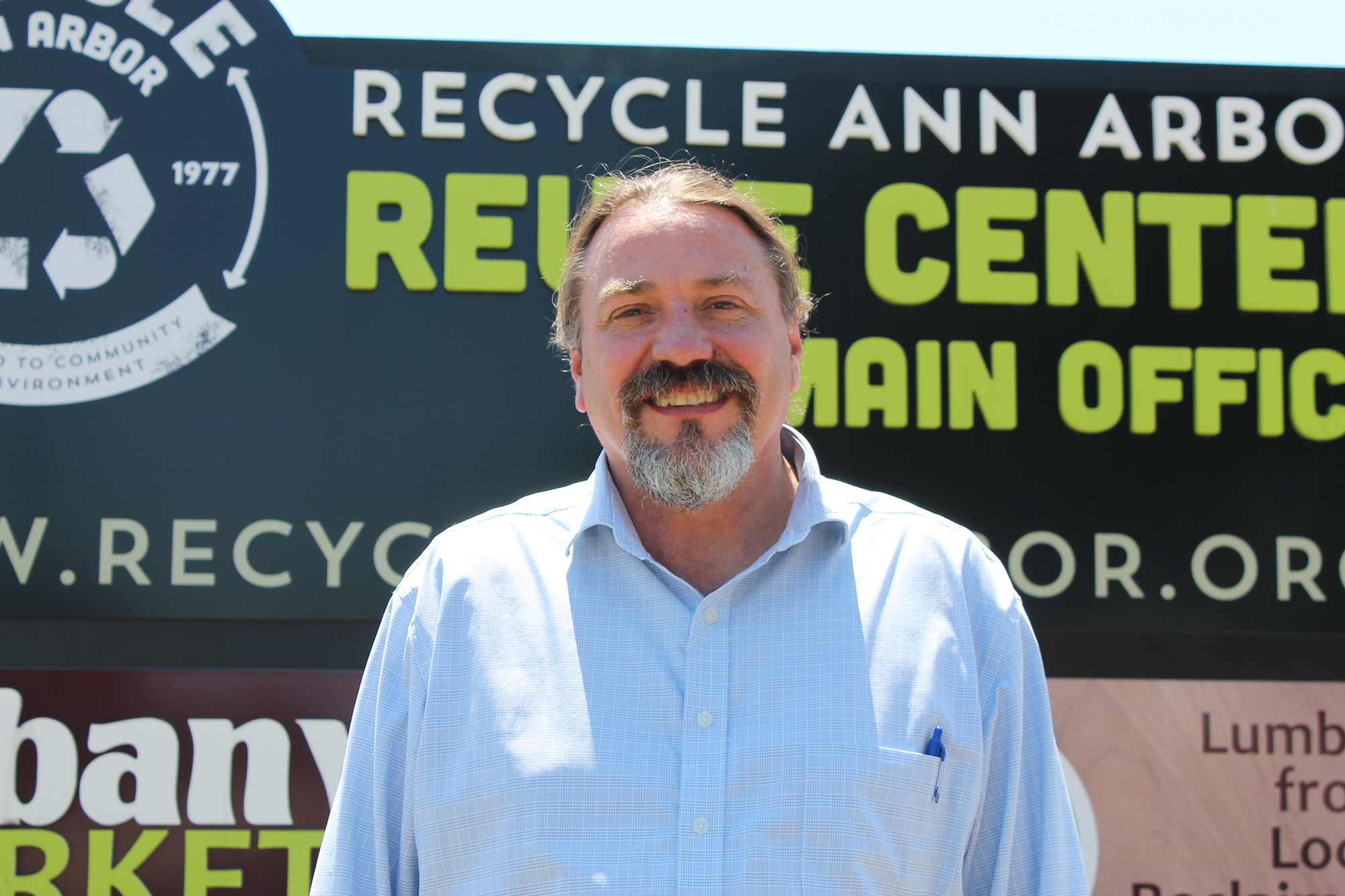All Divisions of Recycle Ann Arbor will be closed on Friday, July 4th. Friday's Curbside Pick-Up recycling will instead take place the following day on Saturday, July 5.

Meet Bryan Ukena, Recycle Ann Arbor's New CEO
August 21st, 2018
In July, national recycling industry leader Bryan Ukena took the helm of Recycle Ann Arbor as its new CEO. Ukena comes to Recycle Ann Arbor after serving as Co-President of Minnesota-based Eureka Recycling, the nation’s largest non-profit recycler. His roots in the recycling industry—he prefers to think of it as a movement—go deep, beginning with activism to initiate Arkansas’ first recycling program. In a recent interview on Ann Arbor’s Community Television Network, Ukena reflected on the trajectory of his career, the reduce-reuse-recycle movement, and Ann Arbor’s promising recycling future.
The full 15-minute interview begins at 5:50. Highlights include:
Ukena’s Personal Background
-Ukena’s anti-waste worldview was shaped from childhood by Oklahoman parents who lived through the Great Depression and the Dust Bowl. “You don’t waste people, you don’t waste money, you don’t waste resources. Waste isn’t a smart thing to do.”
-He discusses the profound influence of a youthful adventure in minimalist living. Watching the sunset from his 1961 Airstream travel trailer in Key West, Ukena was shocked by an odd defining feature of the skyline: an incinerator ash pile that stood higher than anything else in the island city at the time. Acutely aware of his own trash in his small space and confronted with the scale of the community’s, he felt there had to be a better way.
The Recycling Movement, From the 80’s to Today
-At the start of Ukena’s career in the 1980’s, nonprofits on the leading edge (like Recycle Ann Arbor) collected recyclables in school buses and rigged concrete blocks to pulleys to smash the glass. We’ve come a long way from those humble beginnings to the sophisticated processing facilities and large scale of today’s multinational industry.
-A “bell curve of awareness about the power of recycling” has accompanied that progress. It’s great that so many people have adopted recycling as a default habit, but Ukena doesn’t want people to lose sight of its power and purpose. “That relaxed attitude about recycling has really damaged recycling.”
-The thing Ukena most wants people to understand and appreciate? The connection between recycling and climate change. One of the biggest things any individual can do to reduce their carbon footprint—every single day—is to compost and recycle. Your trash should be the smallest of three waste bins in your home.
The Ann Arbor Outlook
-“There’s a lot of opportunity in Ann Arbor. Ann Arbor’s program is very comprehensive right now” and the high level of environmental consciousness here means that there’s “a real willingness” to do more and “push the envelope.” Ann Arbor was at the forefront of recycling when RAA was founded forty years ago and remains positioned for the cutting edge today.
-What distinguishes Recycle Ann Arbor from private waste haulers? “At RAA, we believe that waste is absolutely preventable, that it is not inevitable.” RAA doesn’t approach recycling as a process to maximize for profit; it’s a component of a larger solution. “If you look at nature, everything becomes a byproduct for the next thing, and that’s what RAA is really about and that’s what sets us apart.”
-The end goal is zero waste. “Recycle Ann Arbor isn’t just about driving more trucks around and picking up more recyclables…It’s an entry point for people’s awareness for people to think about what am I throwing away and recycling in the first place and how can I avoid that, and really moving as a society and as a community closer to zero waste.”
-For the shorter term? Ukena hopes Ann Arborites will see recyclables processed locally again soon. RAA is working with the city, looking at regional options, and sees the potential for a new, state-of-the-art Materials Recovery Facility to strengthen the local community in multiple ways. He’s excited about “creating good, living wage jobs where people are safe when they go to work.” Ukena also observes that changes in the global recycling market make local solutions especially valuable and important.